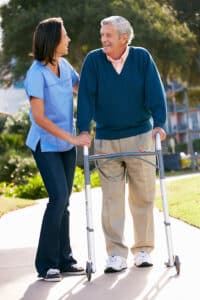
Falls among seniors are a significant concern, not only due to the immediate injuries they can cause but also because they often lead to long-term impairments that affect a senior’s independence and quality of life.
Implementing effective senior fall risk management strategies is crucial for ensuring the safety and well-being of elderly individuals. Here are seven key tips inspired by Aviva In-Home Care’s approach to managing fall risks among seniors in the San Francisco area.
1. Conduct a Home Safety Assessment
Begin by evaluating the senior’s living environment to identify potential hazards. This includes checking for loose carpets, inadequate lighting, cluttered walkways, and any other obstacles that could cause trips and falls.
Senior fall risk management professionals emphasize the importance of modifying the environment to make it safer, which can include installing grab bars in bathrooms, ensuring floors are non-slip, and arranging furniture to create clear pathways.
2. Encourage Regular Physical Activity
Physical activities tailored to the elderly can significantly reduce the risk of falls by improving strength, balance, flexibility, and coordination. Programs like Tai Chi or simple stretching exercises can be highly beneficial. Engaging in regular, suitable exercise helps seniors maintain their physical health and enhances mobility, thus preventing falls.
3. Review Medications Periodically
Many medications can increase the risk of falls due to side effects such as dizziness or dehydration. It’s essential to review all medications with healthcare providers regularly to ensure that side effects or interactions do not increase the risk. Quality senior fall risk management agencies highlight the role of medication management in fall prevention and suggest adjustments where necessary.
4. Ensure Proper Footwear
Footwear plays a critical role in preventing falls. Seniors should wear shoes that provide good support and have non-slip soles. Avoiding loose-fitting slippers or shoes with slick soles can help prevent unnecessary slips, trips, and falls. Ensuring that shoes are both comfortable and secure can significantly reduce the risk of falling.
5. Use Assistive Devices as Needed
Senior fall risk management professionals recommend using tools such as walkers, canes, or wheelchairs to aid mobility. A quality in-home care provider should advise consulting with a professional to get the right fit and training on how to use these devices properly to support safe movement both at home and outside.
6. Educate and Empower
Education about fall risks and prevention strategies is crucial. Seniors and their caregivers should be aware of the risks and preventative measures. The right senior fall risk management companies stress the importance of ongoing education and empowering seniors to express their concerns about fall risks so that proactive measures can be taken.
7. Regular Vision and Hearing Tests
Impaired vision and hearing can greatly increase the risk of falling because they affect balance and spatial awareness. Regular check-ups can ensure that any vision or hearing problems are addressed promptly, possibly with updated prescriptions for glasses or hearing aids, reducing the risk of accidents caused by sensory impairments.
Implementing these strategies requires a cooperative effort between seniors, their families, and professional senior fall risk management professionals. Taking proactive steps to address each area of concern can significantly reduce the risk of falls, leading to safer and more independent living conditions for seniors.
For those interested in a detailed guide and additional resources on managing fall risks for seniors, visiting a quality in-home care agency’s website will likely provide comprehensive insights and professional support options available in their specific area.
At the end of the day, though, keep in mind that fall risks exist regardless of a senior’s age, physical capabilities, medical condition, or activity level, and they are far too easy to overlook. The more time and attention one places on mitigating fall risks, the safer and more protected the aging loved one will often be in the comfort of his or her home.
If you or an aging loved one are considering Senior Fall Risk Management in Burlingame, CA, please contact the caring staff at Aviva In-Home Care today at (415) 463-1400
Aviva In-Home Care provides exceptional senior home care in the Bay Area, including San Francisco, Burlingame, San Mateo, Hillsborough, Atherton, Menlo Park, Palo Alto, Berkeley, Lafayette, Orinda, and surrounding areas.
- How To Help Your Senior Parent Feel Their Best Every Day - May 14, 2025
- Preventing Falls in the Yard - May 6, 2025
- Reducing the Risk of Sarcopenia (muscle loss) in the Elderly - April 22, 2025



